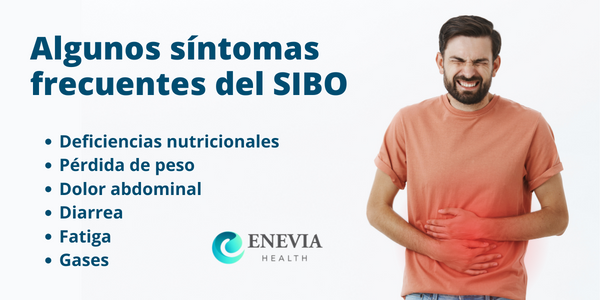CONTACT
We will reply as soon as possible.
Enevia Health, LLC
30 N Gould Ste N, Sheridan, WY 82801, USA
Today we are going to talk about the intestine, specifically the small intestine, and how an imbalance in its bacterial ecosystem can affect our health.
First, we must understand that our gut is filled with trillions of bacteria that make up our gut microbiota. These little creatures are essential to our health. They help digest food, produce vitamins and strengthen our immune system. However, like any ecosystem, balance is key.
When bacteria from the colon, where their presence is normal and necessary, begin to move into the small intestine, they can cause problems.. This is what is known as Small Intestinal Bacterial Overgrowth or SIBO (Small Intestinal Bacterial Overgrowth). This phenomenon can cause bloating, gas, abdominal pain, and poor digestion, due to interference with the normal absorption of nutrients in the small intestine.
This is where laboratory tests come in, in particular, the breath test. This non-invasive test makes it possible to detect the presence of excess bacteria in the small intestine.
The patient ingests a specific substrate, usually lactulose, lactitiol, or glucose. Lactulose and lactitiol are sugars that humans cannot digest, but bacteria can. Glucose, on the other hand, can be absorbed more quickly, limiting its usefulness to the first part of the small intestine.
Bacteria in the small intestine metabolize this substrate and produce gases, such as hydrogen and methane.
The patient blows into a tube at regular intervals to collect breath samples.
These breath samples are analyzed in a laboratory to measure gas levels.
If gas levels rise sooner than would be expected if only colonic bacteria were metabolizing the substrate, the patient likely has SIBO.
Precise details may vary, but in general, a positive result for SIBO is considered if hydrogen levels increase by 20 ppm (parts per million) or more within the first 90 minutes, or if methane levels increase by 12 ppm or more at any time during the test.

Abdominal pain or discomfort: This is often one of the first symptoms of SIBO. The pain can be sharp, stabbing, or a dull, generalized ache.
Bloating and/or abdominal distension: Bloating may be more noticeable after meals and may vary in intensity throughout the day.
gases: People with SIBO often experience increased gas production, which can lead to more frequent belching and flatulence.
Diarrhea or constipation: Abnormal bowel movements are common in SIBO. Some people may experience diarrhea, while others may have constipation. Some people may have both, with bowel movements ranging from one extreme to the other.
unexplained weight loss: Some people with SIBO may experience weight loss without trying, despite having a normal or even increased appetite. This may be due to nutrient malabsorption caused by bacterial overgrowth.
Fatigue: Although fatigue can have many causes, some people with SIBO experience tiredness or exhaustion.
nutritional deficiencies: Due to malabsorption, some people with SIBO may develop vitamin and mineral deficiencies, such as iron or vitamin B12 deficiency anemia.
Food intolerance symptoms: Symptoms similar to those of lactose or gluten intolerance can occur in people with SIBO, even if they are not intolerant of these foods.

We are going to see some examples of people who have dealt with the symptoms of SIBO and how they have managed to improve their health through the modulation of the microbiota.

Carlos, a 35-year-old man, I had been suffering from bloating, gas and chronic abdominal pain. He was constantly uncomfortable and began to avoid social meals for fear of the symptoms. After a SIBO breath test and confirmation of his diagnosis, he worked with a specialized dietitian to adjust your diet. He reduced his consumption of sugars and fermentable carbohydrates (FODMAPs diet) and increased his intake of foods rich in fiber. In addition, she started taking a probiotic recommended by her doctor. After a few weeks, Carlos's symptoms improved significantly.
You do not know what the FODMAPs diet is, we will tell you below

Rosa, a 67-year-old woman, experienced frequent bouts of diarrhea and weight loss, despite having a normal appetite. She felt fatigued and malnourished. After doing the breath test, Rosa was diagnosed with SIBO. With the guidance of a nutritionist, Rosa changed her diet to foods low in FODMAPs, and began supplementing with vitamins and minerals to treat malnutrition.. Over time, her weight stabilized, the bouts of diarrhea decreased, and Rosa felt more energized.

Pedro, 50, led an active life but suffered from bloating and gas after every meal, which made him feel uncomfortable during his daily activities. Through the SIBO breath test, it was discovered that he had a bacterial overgrowth in his small intestine.. Pedro switched to a low FODMAP diet and began taking a specific prebiotic to promote the growth of beneficial bacteria in his gut. This helped Pedro control his SIBO and regain his quality of life.
These examples illustrate how a change of diet and proper supplementation, guided by a professional, can alleviate the symptoms of SIBO. However, each case is unique, so it's important to work with a digestive health specialist to design a personalized treatment plan. And remember, if they suspect they may have SIBO, they can buy their breath test here.
See the list of Enevia Health specialists here.
The FODMAP diet is a temporary eating plan developed by scientists at Monash University in Australia. The word FODMAP is an acronym for the types of carbohydrates this diet seeks to limit:
Fermentable: Refers to foods that are fermented by bacteria in the intestine, producing gas.
Oligosaccharides: They are small chains of sugars and are found in foods such as wheat, rye, legumes, certain types of fruits and vegetables, and in adding fiber to food.
disaccharides: In this case, it mainly refers to lactose, which is found in dairy products.
monosaccharides: In the FODMAP diet, it refers to fructose, which is found in certain fruits, honey, and high fructose corn syrup.
And Polyols: They are sugar alcohols found in certain fruits and vegetables and are also added to sugar-free sweeteners.
These carbohydrates can be difficult for some people to digest and can cause symptoms in people with Irritable Bowel Syndrome (IBS) and Small Intestine Bacterial Overgrowth (SIBO).. The FODMAP diet can help reduce symptoms by limiting your intake of these carbohydrates.
It is important to mention that the FODMAP diet is not a diet for life, but a diagnostic tool and a treatment short term. It is implemented under the supervision of a health professional, usually a dietitian, who guides the patient through three phases:
elimination phase: For several weeks, all high FODMAP foods are eliminated from the diet.
reintroduction phase: Foods are gradually reintroduced to identify those that cause symptoms.
Personalization phase: Once problem foods are identified, a long-term diet is created that limits or eliminates only those foods, but allows other FODMAP foods.
This diet can be quite complicated and restrictive, but can be very helpful in relieving digestive symptoms in people with IBS or SIBO. However, due to its restrictive nature, should always be done under the supervision of a healthcare professional to ensure that the diet remains balanced and nutritious.
📌 Visit us through
Web: https://www.eneviahealth.com
Instagram: https://www.instagram.com/enevia_health/
Youtube: https://www.youtube.com/@EneviaHealth
Facebook: https://www.facebook.com/eneviahealth
We will reply as soon as possible.
30 N Gould Ste N, Sheridan, WY 82801, USA
Our groups are the ideal platform to learn and share your scientific concerns about neurodevelopment issues
*Our purpose is informational only, it is not intended to be a substitute for medical advice, diagnosis or treatment.
We are working on our website. For any queries, you can contact our customer service team at atencionalcliente@eneviahealth.com